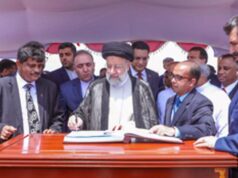Malaysia once was in the forefront in courting Chinese investment, but is now questioning Beijing on its various projects. As a nation Malaysia is fearing becoming overly indebted to China for projects that are neither viable nor necessary. Most of the projects have no value for Malaysia but were used to prop up the previous corrupt government.
Earlier China’s gained favour by successfully courting Mahathir’s predecessor, Najib Razak, with easy loans and showcase projects, and secured deals that were of strategic value for its own ambitions. However in May, Najib was voted out of office by an electorate tired of the corruption scandals swirling around him, some of which involved China’s highest-profile investment deals in Malaysia. Mahathir, 93, was voted into office with a mandate that included getting the country out from under its suffocating debt.
Malaysia’s new PM, Mahathir Mohamad, five-day trip to Beijing has been aimed at freeing his country from some of its $250 billion of debt, owed to Chinese companies. His message in meetings with officials, and in public comments, has been unambiguous.
“We do not want a situation where there is a new version of colonialism happening because poor countries are unable to compete with rich countries,” Mahathir said Monday at the Great Hall of the People in Beijing after meeting with Premier Li Keqiang of China.
Malaysia sits astride the world’s most vital maritime chokepoint, through which much of world trade passes. A Chinese power company is investing in a deepwater port large enough to host an aircraft carrier. Another state-owned Chinese company is revamping a harbor along the fiercely contested South China Sea. Nearby, a rail network mostly financed by a Chinese government bank is being built to speed Chinese goods along a Silk Road. And a Chinese developer is creating four artificial islands that could become home to nearly three-quarters of a million people and are being heavily marketed to Chinese citizens. Each of these projects — along with many more — is being built in Malaysia, and all these are at the heart of China’s effort to gain global influence.
From Sri Lanka and Djibouti to Myanmar and Montenegro, many recipients of cash from China’s huge infrastructure financing campaign, the Belt and Road Initiative, have discovered that Chinese investment brings with it less-savory accompaniments, including closed bidding processes that result in inflated contracts and influxes of Chinese labor at the expense of local workers.
Most of these countries are now realising that China is using its overseas spending spree to gain footholds in some of the world’s most strategic places, and perhaps even deliberately luring vulnerable nations into debt traps to increase China’s dominion as U.S. influence fades in the developing world.
Mahathir’s government has suspended two major Chinese-linked projects amid accusations Najib’s government knowingly signed bad deals with China to bail out a graft-plagued state investment fund and bankroll his continuing grip on power.
On the chopping block were a $13.4 billion contract for the China Communications Construction Co. to build the East Coast Rail Link and a $2.5 billion agreement for an arm of a Chinese energy giant to construct gas pipelines.
“The Chinese must have been thinking, ‘We can pick things up for cheap here,’” said Khor Yu Leng, a Malaysian political economist who has been researching China’s investments in Southeast Asia. “They’ve got enough patient capital to play the long game, wait for the local boys to overextend and then come in and take all that equity for China.”
“The ‘Belt and Road Initiative’ (BRI) is intended to develop strong economic ties with other countries, shape their interests to align with China’s and deter confrontation or criticism of China’s approach to sensitive issues,” said a Pentagon report released Thursday. “Countries participating in BRI could develop economic dependence on Chinese capital, which China could leverage to achieve its interests.”
Malaysia’s new finance minister, Lim Guan Eng, raised the example of Sri Lanka, where a deepwater port built by a Chinese state-owned company failed to attract much business. The indebted South Asian island nation was compelled to hand over to China a 99-year lease on the port and more land near it, giving Beijing an outpost near one of its busiest shipping lanes.
“We don’t want a situation like Sri Lanka where they couldn’t pay and the Chinese ended up taking over the project,” Lim said.
In a recent interview with The New York Times, Mahathir made clear what he thought of China’s strategy.
“They know that when they lend big sums of money to a poor country, in the end they may have to take the project for themselves,” he said.
“China knows very well that it had to deal with unequal treaties in the past imposed upon China by Western powers,” Mahathir added, referring to the concessions China had to give after its defeat in the opium wars. “So China should be sympathetic toward us. They know we cannot afford this.”
Malaysia has long served as a prize of empires, with a geopolitical importance that belies its relatively small size. The Portuguese, Dutch and British flocked here, eager to control a fulcrum linking the Pacific and Indian oceans. China is the latest power to try to share in the riches.
Kuantan, a Malaysian city nestled on the South China Sea coast, had never been a hot spot. But then China began adding military heft to its territorial aspirations in the sea, where five other governments, Malaysia’s included, have competing claims.
Chinese financing began washing over Kuantan five years ago. Guangxi Beibu Gulf International Port Group, a state-owned firm from an obscure Chinese autonomous region, won a contract supported by the Malaysian government to build a deepwater terminal and industrial park. Nearby was a planned stop on the East Coast Rail Link that would mostly be financed by the Export-Import Bank of China, a government institution.
Kuantan residents, though, have long worried that the city could be saddled with white-elephant projects.
“We welcome foreign investment and development, but we question the huge price that we will have to pay,” said Fuziah Salleh, a Kuantan lawmaker for Malaysia’s new governing coalition. “Who is the real beneficiary of all this financing? The Malaysians, or the Chinese?”
“I am worried that our sovereignty has been sold,” Fuziah said.
Mahathir, however, is not averse to standing up to the superpower of the day. He was prime minister before, from 1981-2003, and back then he railed against the United States and other Western countries for what he said was a plot to hold back developing nations like Malaysia.
“Mahathir thinks China is a hegemonic force that can control economies like Malaysia,” said Edmund Terence Gomez, a political economist at the University of Malaya in Kuala Lumpur, Malaysia. “He’s always been worried about powerful forces. Before it was the U.S., now it’s China.”
Mahathir’s administration has been in power for little more than 100 days. In that time, Malaysian officials say, they have discovered that billions of dollars in inflated Chinese contracts were used to relieve debts associated with a Malaysian state investment fund at the heart of a graft scandal that led to Najib’s downfall.
Sitting at his desk during an interview after the election, Mahathir pointed to a sheaf of papers before him. It was a proposal from a Malaysian construction company that he said contained evidence that the East Coast Rail Link could have been developed by a Malaysian company for less than half the $13.4 billion contract won by the China Communications Construction Co., a state-owned Chinese firm with extensive operations overseas.
Notably, the rail tender process was closed.
Last week, Lim, the finance minister, told parliament that Malaysia would not be able to cover the operational cost for the railway, much less the capital expenditure, which he estimated at nearly $20 billion rather than $13.4 billion.
Neither the Chinese company nor its Malaysian partner responded to requests for comment.
“It looks like not all the money is being used for building the railway line,” Mahathir said of the East Coast Rail Link deal. “The likelihood is the money has been stolen.”
Malaysian investigators are looking into whether an associate of Najib’s stepson may have brokered the rail deal to alleviate the debt accrued by 1MDB or to fund Najib’s re-election campaign.
While the role of Chinese money in bailing out Najib’s indebted administration has received the most attention, another Chinese megaproject raises even sharper questions about Beijing’s geopolitical aims.
The Malaysian city of Malacca was once a conduit for spices and treasures that flowed from Asia to Europe. The strait named after the city is still the channel through which much of Asia’s seaborne trade — and most of China’s oil imports — flows.
But Malacca’s port silted up centuries ago and is now a backwater. Instead, nearby Singapore, which sits at the southern end of the Strait of Malacca, ranks as the world’s busiest transshipment hub.
A $10 billion development project — backed by PowerChina International, a major Chinese utility, and two Chinese port developers — is supposed to propel Malacca back into global significance, as a vital stop on a maritime trade route that stretches from Shanghai to Rotterdam, Netherlands.
The plan for the project, Melaka Gateway, includes three artificial islands and an expanded natural islet, which will hold an industrial park, cruise terminal, theme park, marina, offshore financial hub and self-styled seven-star hotel.
And there will be a new deepwater port, with berths large enough to host an aircraft carrier. The port operator was given a 99-year lease for the deepwater terminal, rather than the more common 30-year time frame.
The local partner in Melaka Gateway is KAJ Development, which counts among its previous accomplishments building the local zoo and bird park.
To explain how a little-known company was able to partner with Chinese firms to transform such a strategic spot, locals have remarked on the close ties between the head of KAJ Development and Najib’s party machine. The company did not respond to a request for comment.
Beijing has funded the building of ports across the Indian Ocean, a strategy known as the string of pearls. Military experts have raised the possibility that these ports could one day welcome Chinese warships and submarines.
“You look at a map, and you can see the places where China is plotting ports and investments, from Myanmar to Pakistan to Sri Lanka, on toward Djibouti,” said Liew Chin Tong, Malaysia’s deputy defense minister. “What’s crucial to all that? Our little Malaysia, and the Malacca Strait.”



